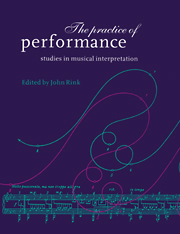Book contents
- Frontmatter
- Contents
- Preface
- PART ONE FUNDAMENTALS
- PART TWO STRUCTURE AND MEANING IN PERFORMANCE
- 5 The conductor and the theorist: Furtwängler, Schenker and the first movement of Beethoven's Ninth Symphony
- 6 A curious moment in Schumann's Fourth Symphony: structure as the fusion of affect and intuition
- 7 Beginning–ending ambiguity: consequences of performance choices
- 8 Strategies of irony in Prokofiev's Violin Sonata in F minor Op. 80
- PART THREE PERFORMANCE AS PROCESS
- Index
8 - Strategies of irony in Prokofiev's Violin Sonata in F minor Op. 80
Published online by Cambridge University Press: 10 October 2009
- Frontmatter
- Contents
- Preface
- PART ONE FUNDAMENTALS
- PART TWO STRUCTURE AND MEANING IN PERFORMANCE
- 5 The conductor and the theorist: Furtwängler, Schenker and the first movement of Beethoven's Ninth Symphony
- 6 A curious moment in Schumann's Fourth Symphony: structure as the fusion of affect and intuition
- 7 Beginning–ending ambiguity: consequences of performance choices
- 8 Strategies of irony in Prokofiev's Violin Sonata in F minor Op. 80
- PART THREE PERFORMANCE AS PROCESS
- Index
Summary
The kings of Siam, it is said, had a way of punishing nobles by honouring them with a gift of a sacred white elephant, a gift they were unable to decline but obliged to maintain at ruinous expense.
(Muecke 1982: 9)Irony can be seen as one of the central (if intrinsically slippery) turns of thought in the critical and artistic discourses of the twentieth century. We live in a generation particularly, peculiarly sensitised to those facets of the ironic that have become dominant modes within a postmodernist aesthetic; it is also a generation for which those ironies are redoubled through the disjunctions created between a critical-theoretical stance demanding radical undermining of presumed categories and identities, and an emergent global, political condition in which new nationalisms and ethnic/religious identities are attempting to recategorise the world and the individual subject within an increasing number of less negotiable boundaries. The substitution of political diffraction for postmodern pluralism – further ironised by the new global networking and transnational economic dependencies – is nowhere seen more clearly than in the former Soviet Union and Eastern Bloc, and it seems a particularly appropriate time to reinvestigate the music of Prokofiev within such a context, especially since the composer has been curiously neglected in the musicological and analytical literature, by comparison, say, with his near-contemporary Shostakovich.
In music, notions of the ironic – though still lamentably under-researched – are of long standing and diverse manifestation.
- Type
- Chapter
- Information
- The Practice of PerformanceStudies in Musical Interpretation, pp. 170 - 194Publisher: Cambridge University PressPrint publication year: 1995



